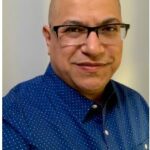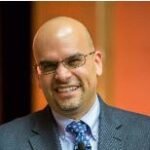Our Story
El Futuro is a community-based nonprofit organization that seeks to transform Latino-serving mental health care in North Carolina and beyond. We provide bilingual and culturally-responsive mental health services including therapy, psychiatry, substance use treatment, and case management in a welcoming environment of healing and hope.
Founded as a volunteer project by Dr. Luke Smith in 2001 to address the unmet need for bilingual mental health services for North Carolina’s growing Latino immigrant community, we were incorporated as a nonprofit in 2004. Our mission is to nurture stronger familias to live out their dreams.
As North Carolina’s Latino community has grown, so have we. El Futuro is now North Carolina’s leading provider of, and trusted resource for, bilingual and culturally-responsive mental health services. We serve more than 2,500 Latino youth and adults every year through outpatient clinics in Durham and Siler City, and reach more than 53 counties with our telehealth services. Our award-winning team includes more than 25 psychiatrists, therapists, social workers, and case managers, supported by program and administrative staff – all of whom hold El Futuro’s mission close to their heart.
We meet clients where they are with a warm, outstretched hand. Instead of asking “what is your chief complaint?” we ask “what are your dreams?”, engaging those coming to us with a lens of affirmation and transformation.
“Making mental health care accessible for underserved Latino families improves their quality of life and helps people get back to their dreams for the future that brought them to our community in the first place. It creates a better, healthier community for us all.”
-Dr. Luke Smith, Psychiatrist and Executive Director of El Futuro

In pursuit of our mission, we also:
- Build statewide capacity to provide culturally-responsive care through the La Mesita Latinx Mental Health Professional Network, whose 1,300+ members serve every county in North Carolina and beyond.
- Advocate for system-wide change to better serve North Carolina’s growing Latino community, which now represents more than 10% of our population.
- Participate in research and evaluation when it helps the families we serve.
- Reach beyond our clinic walls and engage more deeply with our community, neighbors, and partner organizations – increasing social connection, building cultural resilience and pride, and strengthening protective factors that support families and individuals.
- Create vibrant, therapeutic spaces that nurture, represent and celebrate individual and community identities in support of community mental health.
We recognize and respect the rich cultural traditions, strong family connections, and community cultural wealth that our Latino neighbors bring to our state.
El Futuro is an AHEC Center for Excellence, and we have been honored to receive numerous awards throughout the years. Our most meaningful achievements, however, are when families grow stronger and get back to their dreams for the future that brought them to our community in the first place. We’re honored to know that our number one source of referrals is from friends and family of clients, reflecting the confianza (trust) we’ve built with Latino families over the years.
Our vision is that all Latino families who seek mental health support can access appropriate services and function at their most vibrant at home, work, and school, strengthening our entire community.
Learn more about our staff and board here.

 Alvely Alcántara, LCSW
Alvely Alcántara, LCSW Rossy C. Garcia, MEd
Rossy C. Garcia, MEd  Katy Sims, MD
Katy Sims, MD  Everardo Aviles, LCSW, LCAS (Eve)
Everardo Aviles, LCSW, LCAS (Eve) As a medical anthropologist and social work researcher, Dr. Gulbas’ research embodies interdisciplinarity through the integration of applied theories of health and human development with qualitative and ethnographic methodologies. Her work seeks to understand how people—children, families, and providers—navigate complex sociocultural landscapes in the pursuit of mental health. Most of her work, to date, focuses attention on developing more robust interpretations of suicide risk. With funding from the National Institutes of Mental Health, this body of research has contributed to advancements in theoretical and empirical knowledge of the broader contexts within which youth suicide risk is situated.
As a medical anthropologist and social work researcher, Dr. Gulbas’ research embodies interdisciplinarity through the integration of applied theories of health and human development with qualitative and ethnographic methodologies. Her work seeks to understand how people—children, families, and providers—navigate complex sociocultural landscapes in the pursuit of mental health. Most of her work, to date, focuses attention on developing more robust interpretations of suicide risk. With funding from the National Institutes of Mental Health, this body of research has contributed to advancements in theoretical and empirical knowledge of the broader contexts within which youth suicide risk is situated.  R. Gabriela Barajas-Gonzalez is a developmental psychologist and an assistant professor of Population Health at NYU Grossman School of Medicine. Dr. Barajas-Gonzalez is the principal investigator of a study that examines the impact of immigration-related threat and stress on school communities. She earned a PhD in developmental psychology from Columbia University and hold a BA in human biology from Stanford University. Dr. Barajas-Gonzalez is the daughter of Mexican immigrants and a first gen college student.
R. Gabriela Barajas-Gonzalez is a developmental psychologist and an assistant professor of Population Health at NYU Grossman School of Medicine. Dr. Barajas-Gonzalez is the principal investigator of a study that examines the impact of immigration-related threat and stress on school communities. She earned a PhD in developmental psychology from Columbia University and hold a BA in human biology from Stanford University. Dr. Barajas-Gonzalez is the daughter of Mexican immigrants and a first gen college student. Dr. Parra-Cardona is an Associate Professor in the Steve Hicks School of Social Work (SHSSW) at the University of Texas at Austin. At the SHSSW, he serves as Coordinator for Mexico and Latin American initiatives. He also serves as Area Director for Research at the UT Austin Latino Research Institute. Dr. Parra-Cardona’s program of research is focused on the cultural adaptation of evidence-based parenting interventions for low-income Latinx populations in the US and Latin America.
Dr. Parra-Cardona is an Associate Professor in the Steve Hicks School of Social Work (SHSSW) at the University of Texas at Austin. At the SHSSW, he serves as Coordinator for Mexico and Latin American initiatives. He also serves as Area Director for Research at the UT Austin Latino Research Institute. Dr. Parra-Cardona’s program of research is focused on the cultural adaptation of evidence-based parenting interventions for low-income Latinx populations in the US and Latin America. Bianka Reese, PhD, MSPH is a research scientist and program evaluator specializing in adolescent and young adult sexual and reproductive health. Her previous research in the experiences of Latinx LGBTQ+ youth stems from her work as the Research and Evaluation Manager at SHIFT NC (Sexual Initiatives For Teens), where she led largescale evaluations of multilevel, community-based sexual health promotion initiatives and research projects aimed at elevating the voices of diverse youth in North Carolina. Dr. Reese is currently the Senior Research Strategist at Creative Research Solutions, LLC, an award-winning national evaluation, research, and assessment firm.
Bianka Reese, PhD, MSPH is a research scientist and program evaluator specializing in adolescent and young adult sexual and reproductive health. Her previous research in the experiences of Latinx LGBTQ+ youth stems from her work as the Research and Evaluation Manager at SHIFT NC (Sexual Initiatives For Teens), where she led largescale evaluations of multilevel, community-based sexual health promotion initiatives and research projects aimed at elevating the voices of diverse youth in North Carolina. Dr. Reese is currently the Senior Research Strategist at Creative Research Solutions, LLC, an award-winning national evaluation, research, and assessment firm. Tania Connaughton-Espino, MPH is an independent researcher focused on adolescent and young adult sexual and reproductive health. Her interest in the experiences of Latinx LGBTQ+ youth stems from her previous work with SHIFT NC (Sexual Initiatives For Teens), where she led the training and evaluation department, conducted capacity-building workshops for youth serving professionals including on the topic of how to be more affirming of LGBTQ youth, and from her extensive experience working with the Latinx population in NC.
Tania Connaughton-Espino, MPH is an independent researcher focused on adolescent and young adult sexual and reproductive health. Her interest in the experiences of Latinx LGBTQ+ youth stems from her previous work with SHIFT NC (Sexual Initiatives For Teens), where she led the training and evaluation department, conducted capacity-building workshops for youth serving professionals including on the topic of how to be more affirming of LGBTQ youth, and from her extensive experience working with the Latinx population in NC. Maru Gonzalez, EdD is an Assistant Professor and Youth Development Specialist in the Department of Agricultural and Human Sciences at North Carolina State University. Her areas of inquiry include youth development with a focus on activism, social justice, and the experiences of LGBTQ+ young people across familial, school, and community contexts.
Maru Gonzalez, EdD is an Assistant Professor and Youth Development Specialist in the Department of Agricultural and Human Sciences at North Carolina State University. Her areas of inquiry include youth development with a focus on activism, social justice, and the experiences of LGBTQ+ young people across familial, school, and community contexts.  Nayeli Y. Chavez-Dueñas, PhD
Nayeli Y. Chavez-Dueñas, PhD Hector Y. Adames, PsyD
Hector Y. Adames, PsyD